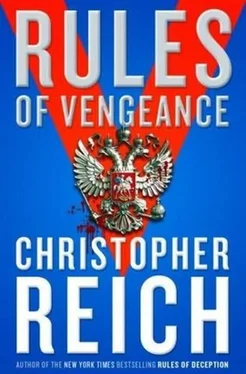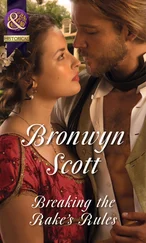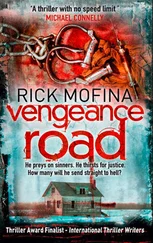“Did you hear me?” said Graves.
Still Jonathan didn’t answer. Like a blind man, he reached out a hand and probed until he found a chair, then felt his way to sitting down in it.
“What is it, then?” asked Graves, more with irritation than with curiosity.
“There’s a problem,” said Jonathan, sotto voce.
“You’re right about that,” said Graves, hovering nearby. “Your story isn’t checking out. And we’re going to clarify it right now.”
“I mean with my head. It’s killing me.”
“Hell do you mean?”
“Something’s wrong. I don’t know what it is. I’ve got a terrible headache.” He gasped. “I’m having trouble with my sight. Could be dehydration or a concussion.”
“You’ll see fine soon as we get you some fresh air. Drink some water and you’ll be good as new.” Graves knelt at his feet and fumbled with the monitoring bracelet. “Give me your leg. Either one. Your choice.”
Jonathan moaned and extended his left leg. Graves slipped the metal cuff over his ankle and snapped it closed. He gave it a tug to make sure, then leaned back on his haunches. “There, now. Open your eyes. Can you see me all right?” He lifted his chin to look Jonathan straight in the eye.
And that was when Jonathan kicked him.
He kicked hard with his right foot, striking Graves’s jaw precisely where he’d aimed, an inch or so below the ear, where the mandible met the skull. Graves tumbled onto his back, stunned. Before he could react, Jonathan fell onto his chest, a forearm pinning his neck to the carpet, the fingers of his right hand pressing against Graves’s carotid, stanching the flow of blood to the brain. Graves thrashed. He threw a wild punch that glanced off Jonathan’s cheek. And then, like that, he was out. His eyes rolled back into his head. He expelled a breath of air and his body went limp.
Six seconds had passed.
Jonathan kept the artery blocked until he was certain that Graves was unconscious, then climbed to his feet. A mirror hung on the wall, and he found himself staring at a wild-eyed man fighting for breath. There’s no other way , he told himself.
Kneeling once more, he dug inside Graves’s jacket for the key to the ankle bracelet. He found it and unlocked the cuff. Then he removed Graves’s wallet and his phone. His hand brushed against the butt of Graves’s pistol, but he decided against taking it. A criminal takes a gun. An innocent man leaves it. Standing, he hurried to the door. A peek through the spy hole showed not one but two plainclothes officers standing to either side of it.
Just then Graves’s phone rang. Jonathan dashed into the bathroom and closed the door. The name on the screen read Director General Allam. He took it to mean the director of MI5. Yanking a towel off the rack, he stuffed the phone into its folds. Four interminable rings later, it went silent. He ran back to the door, but the guards had not budged. Graves still lay immobile. He would remain unconscious anywhere from three to ten minutes. There was nothing Jonathan could do to lengthen the period, save suffocate him. He disliked Graves enough to carefully consider the idea.
Jonathan crossed the room and opened the sliding doors that gave onto the balcony. He went to the railing and leaned his head over. He stood eight stories aboveground, approximately 60 meters above the hotel’s main entrance. Each balcony was protected by an awning. The one below was at most a meter beneath his terrace. Technically, it was not a difficult descent. He was an experienced alpinist. He’d down-climbed sheer faces offering holds the width of a table knife more times than he could remember. He reminded himself that he’d also had a rope and harness securing him in one form or another to the rock and that on any number of occasions he’d slipped. This time there was no margin for error.
Dusk was falling. The sky had tempered to a tame violet. Traffic on Park Lane was a dense, slow-moving braid. Below in the courtyard, a steady stream of taxis and automobiles passed beneath the porte cochere. There were too many heads milling about to count. Just don’t look up , he ordered them.
He slipped on the windbreaker and stuffed Graves’s wallet and phone into the pockets. As an afterthought, he raised Graves’s pants leg and cuffed the electronic bracelet around his ankle. The key went down the toilet. Then Jonathan returned to the balcony and deftly climbed over the railing.
He knelt.
He grasped the terrace with his fingertips.
He lowered one leg until it touched the top of the awning.
Then his actions grew fleet and agile. Freeing one hand, he reached down to locate the steel rods that constituted the awning’s support. Stretching, he slipped his fingers beneath the flap and wrapped them around the bar that formed the awning’s horizontal support. Then, as quickly as he could, he freed the other hand and did the same. All ten fingers now clutched the bar. At that instant, he kicked his legs free and swung out and down. The awning groaned, but held. He landed his feet on the narrow railing of the seventh-floor balcony.
He gazed into the window. No one was there. Drawing a breath, he lowered himself to the terrace and repeated the motions until he reached the sixth floor. Sweat burned his eyes and creased his palms. It wasn’t the heat so much or the exertion, but the mental stamina required to guard against the smallest mistake. He felt no anxiety, nothing that he could label as fear. The world had shrunk to the 2 meters above him and the 2 meters below.
Stretch. Grip. Drop your legs. Land just there. Breathe .
Jonathan’s every energy focused itself on the calculus of coordinating mind and body to hoodwink gravity. As he gained confidence, he moved more rapidly. He made it to the fifth floor, then the fourth, and then he was standing on the pebble-strewn roof of the porte cochere. Four minutes had passed. He ran to the side of the rooftop, bounded the waist-high rail, lowered himself off the edge, and dropped to the ground.
He landed next to one of the frock-coated doormen, who jumped in surprise. Flushed, Jonathan patted him on the shoulder. “I’m a hotel guest. Can you get me a taxi?”
“Certainly, sir. Where to?”
“Heathrow.”
A two-pound coin secured the bargain. The doorman blew his whistle and waved up the next taxi in line.
“Heathrow, sir?” asked the driver.
“I’ve changed my mind,” said Jonathan. He chose the busiest place in London at this time of night. “Piccadilly Circus. Take me to the bottom of Shaftesbury Avenue.”
“Right-o.” The taxi peeled out of the drive and turned down Park Lane. They’d gone half a mile when Graves’s phone rang. This time Jonathan answered. “Yes?” he said.
“Ransom,” said Graves softly, “you’ve made a serious mistake.”
“Maybe.”
“I’ll give you one chance. Come back this second and our deal’s still on. Help us find your wife and you’ll go free. Otherwise, all bets are off.”
“How is that a deal? I wasn’t involved in the bombing. What you’re talking about is blackmail.”
“Call it what you like. It is what it has to be.”
“You said you heard about Division. Then you know what I said about her is true.”
“I heard a rumor. It doesn’t change a thing.”
“Who told you? Was it someone named Connor? Frank Connor?”
“I can’t reveal that.”
“If you want my help, you’d better.”
Graves pounced on the invitation. “So you do know where she is?”
“I didn’t say that.”
A pause. “And I already told you. It was my oppo at the FBI. Sorry, no names, but it wasn’t Connor. What exactly did your wife do?”
“Division used to be headed by Major General John Austen. You might have read about him. The American general killed in a car crash in Switzerland last February.”
Читать дальше












